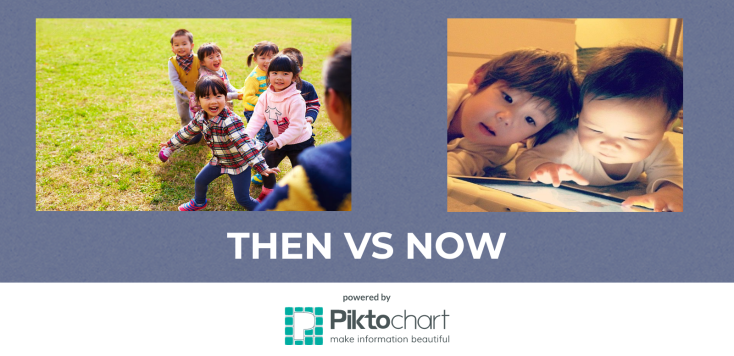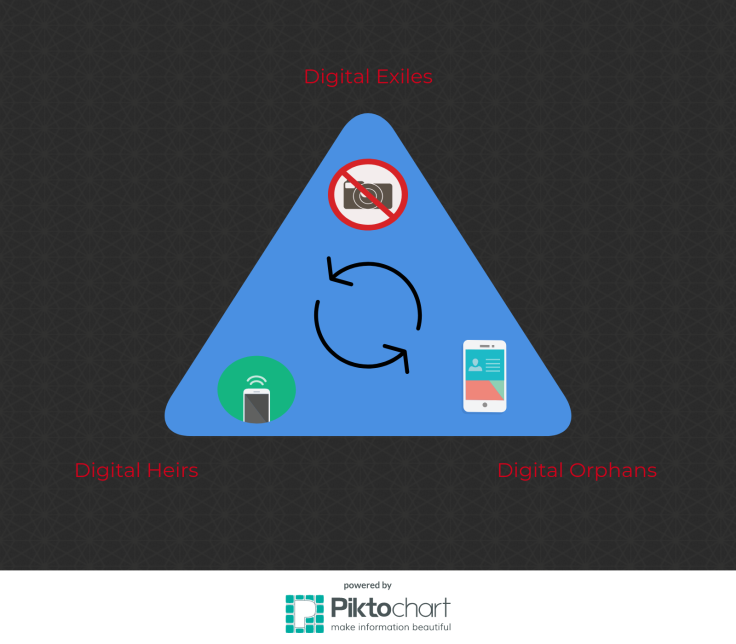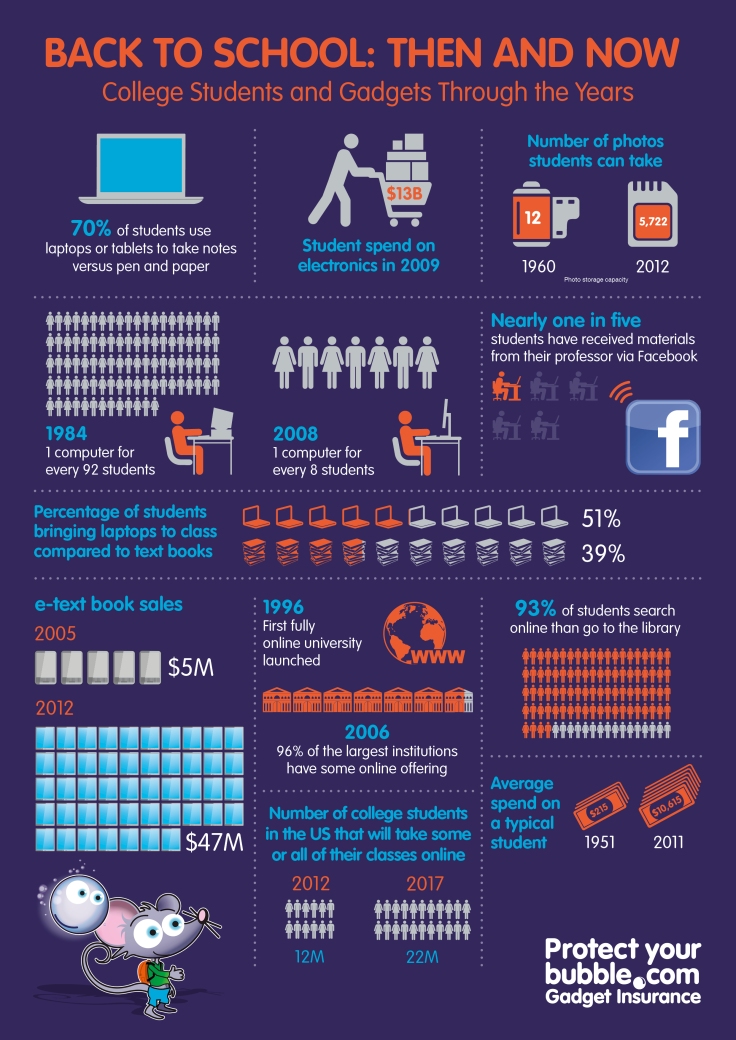
Looking back when my parents was a kid, the Web seems so foreign. But compared to me, the Web seems otherwise. Through Prensky (2011) theory, everyone is either natives or immigrants. But now times have changed, as the Web is incorporated into our daily life.
Samuel (2017) suggest that there are 3 distinct groups of young people based on how parents manage their kids’ use of technology in very different ways.

Digital Orphans – have grown up with a great deal of tech access but very little guidance.
Digital Exiles – are at the opposite extreme, they have been raised with minimal technology.
Digital Heirs – have impressive tech skills, thanks largely to their parents and teachers.
Being in a well-to-do family, I was fortunate to have access to the Web. I would consider myself as in between orphans and heirs. My parents would not limit my usage and they gave me the freedom to explore. At the same time, they would teach me on how to use it responsibly.

The digital world has enhanced my learning. For example, doing a research. In the past, people would have to go to the library and find articles. But now, we would just have to search it online. Digital learning has changed the way people learn and has helped us to learn better.
I believe that the difference in digital knowledge does cause an effect. It will determine how we progress further. I feel that the way people relate to technology will definitely shape the future.
(273 Words)
Reference:
Alexandra Samuel (2017). Opinion: Forget “Digital Natives.” Heres’s How Kids Are Really Using The Internet [online] Available: https://ideas.ted.com/opinion-forget-digital-natives-heres-how-kids-are-really-using-the-internet/
FutureLearn. (2017). Page from Learning in the Network Age – University of Southampton. [online] Available at: https://www.futurelearn.com/courses/learning-network-age/3/steps/263012#fl-comments
FutureLearn. (2017). Page from Learning in the Network Age – University of Southampton. [online] Available at: https://www.futurelearn.com/courses/learning-network-age/3/steps/263013#fl-comments

Hi Julian, it’s interesting to note that you brought up the 3 categorisation of digital users based on Alexander Samuels’ opinion. Let’s delve into the motivation side of things, would you consider Digital Exiles’ and Digital Orphans’ levels of motivation to be put on the same plane of comparison?
Drawing another string of thought, because of what Digital Heirs have inherited, do you think the susceptibility to fall into complacency is very apparent? It is interesting to note of the importance of data that we more often than not neglect/oversee. For instance, in the case of our social media, theres a legacy value attached to it. There are even digital asset planning provided nowadays to help the transference of will onto the individuals’ successors (http://blog.dorschlawfirm.com/2015/11/the-importance-of-digital-computer-asset-planning-and-organization.html). Virtual status and “face” can be parred to reality, I for one can match my digital persona to that of my real-life persona, only that I feel that facing people is still of a higher importance, and it’s scary what the future of digital space can really be. “Keyboard warriors” are a derogative term of the past, people are championing the digital space because “Data is King”.
Thank you for your post, it really supplemented my understanding, shedding different light on types of digital users, which stemmed into more critical thinking.
LikeLiked by 2 people
Hi Amoz, I would put the level of motivation of the 3 distinct groups the same for comparison. I believe that the 3 distinct groups are at the extreme ends of a triangle. Motivation is a huge factor in itself. For example, if a kid will not be able to learn effectively when there is no motivation even though he may be exposed to a variety of technology. Therefore, motivation in such theory will be a constant.
LikeLike
Hi Julian! Credits for putting up your digital differences so succinctly! I agree that the web has changed our interactions with it, especially when it comes to learning. By providing easier access to information and its high level of convenience, the web allows us to learn more efficiently.
I find that Samuel’s ideology of the 3 distinct groups interesting. Personally, I feel that those 3 groups of kids are just grouped based on their accessibility to the digital world. I used to think that digital heirs would be the best at learning given their ability to access the web proficiently. However, this video suggests that e-learning can actually negatively affect a child’s brain. (http://www.channelnewsasia.com/news/catch-up-tv/why-it-matters/can-e-learning-make-you-dumb-9378062)
Do you think that factors such as country of residence, motivation, ethnicity, etc. plays a part in the learning of each group? Which group of kids do you think will be successful moving forward?
LikeLiked by 2 people
Hi Nicholas!
I agree with the video that you suggested. Exposure to the internet for too long could lead to addiction. Therefore, there is a need for parents and teachers to educate kids and monitor their activities. Through those mentoring, I believe that using of technology will increase the pros and reduces the cons. But the end of the day, I feel that the best way to teach kids is through communications and interaction. The use of technology will only act as a tool but not a way of learning. I believe that there are many other factors that play a part in learning. There is no one true way to learn as I feel that it depends on the individual personality. Therefore, we have to be flexible in learning.
LikeLike
Hey Julian! I, too, believe that there are many ways of learning. The use of technology and internet such as learning apps can be used in moderation or for rewarding purposes. As a digital orphan and heir, you are exposed to these apps. If you were a father, which category would you want your child to be (when they are at the age of 5 and below)?
LikeLike
Hi Julian,
Thank you for the interesting read, especially with the incorporation of Samuel’s three distinct categories of young people!
You mentioned that that, the digital world has enhanced your learning and changed the way people learn. To which, I do agree to a certain extent. Convenience is definitely one of the factors, as information can be found through the click of a finger.
However, would the digitalised world be able to fully replace the information we need? How credible would it be? The quality of information available online? Compared to academic journals and articles from the libraries? Even then, how credible are information found in the publications from libraries? https://theidaholibrarian.wordpress.com/2012/11/12/libraries-vs-google/
I would love to hear your opinion on the question!
Great job on the infographic featuring the usage of technology in schools! Perhaps, you could link it to how this shift in technology is similar to what you have experienced?
[Word Count: 150 Words)
LikeLiked by 1 person
Hi Victoria, thanks for commenting on my blog. I feel that the digitalised world will not be able to fully replace the information we need. But it will be used to find the majority of the information we need. The main reason would be convenience. We can get the information where ever we are. But that’s the pros. The cons will be as you stated, which is reliability. Therefore, there is a need to teach kids about the Internet and not trusting everything online. I believe if we are able to teach kids about how and where to get information in terms of creditability and reliability, the internet will be a useful tool for them to learn better.
LikeLiked by 1 person
Hi Julian,
Thank you for your reply! I do agree with you on this. When people are taught on doubting the credibility of information and not trusting everything they read all the time, they would definitely be able to learn better.
Looking forward to read more of your posts!
Cheers!
LikeLike